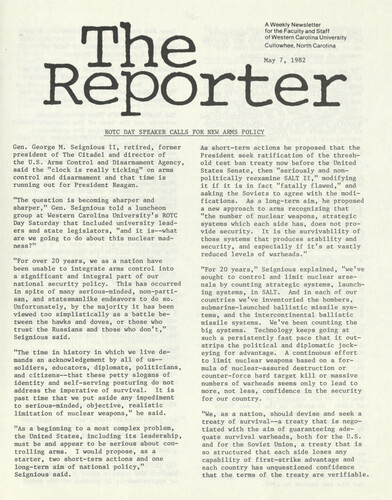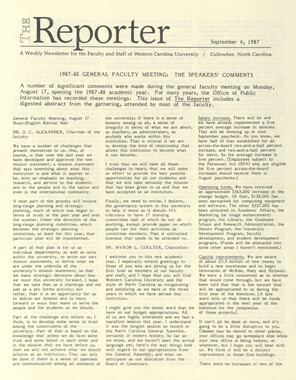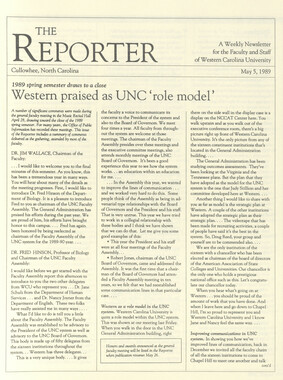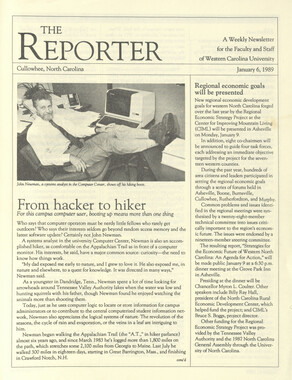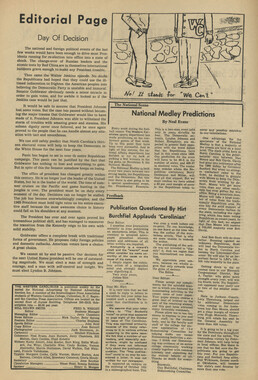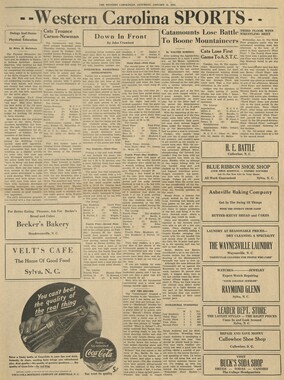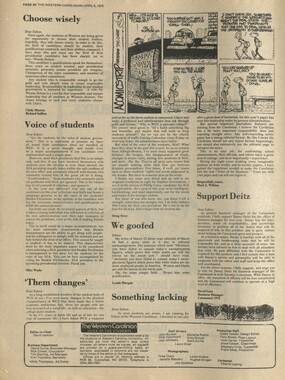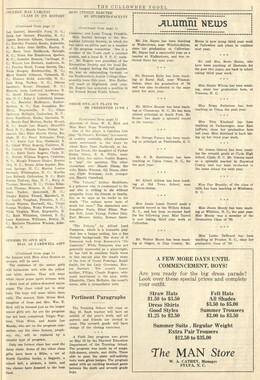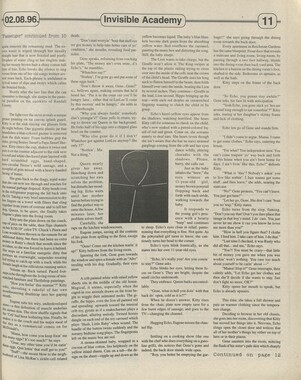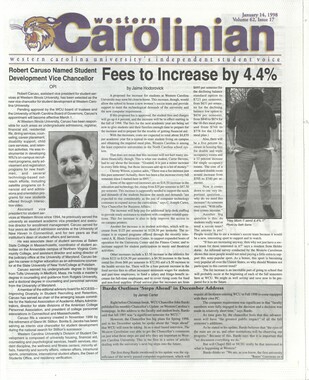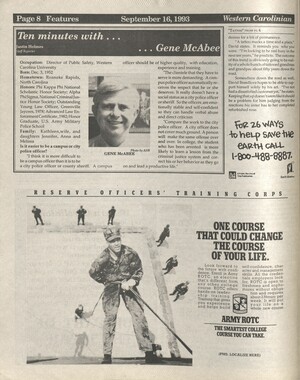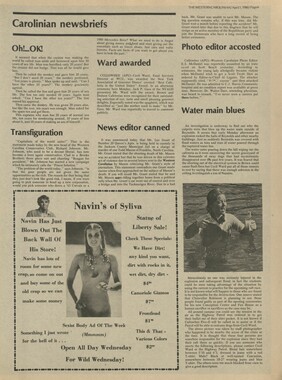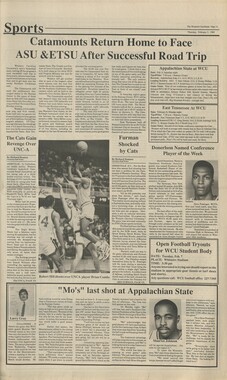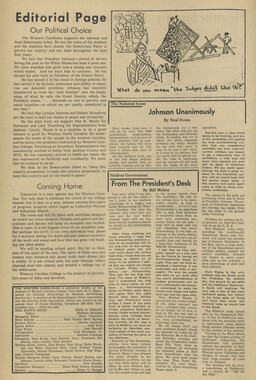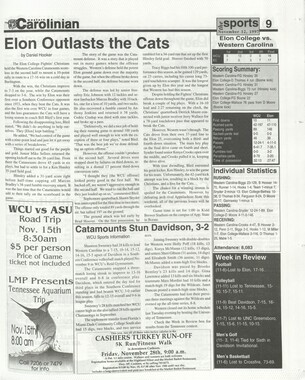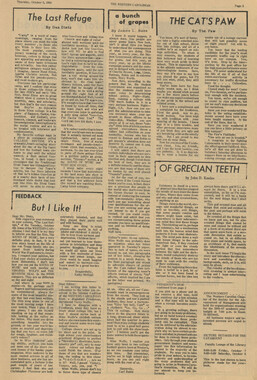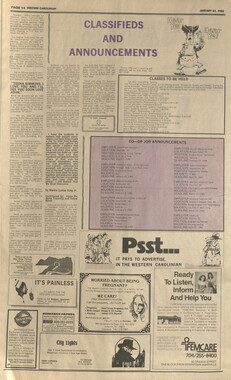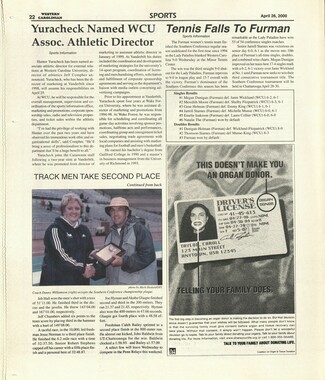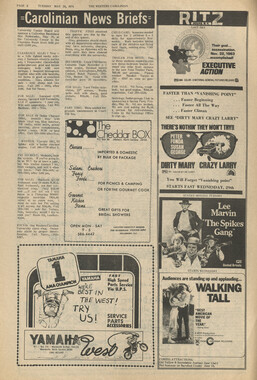Western Carolina University (20)
View all
- Canton Champion Fibre Company (2308)
- Cherokee Traditions (293)
- Civil War in Southern Appalachia (165)
- Craft Revival (1942)
- Great Smoky Mountains - A Park for America (2767)
- Highlights from Western Carolina University (430)
- Horace Kephart (941)
- Journeys Through Jackson (154)
- LGBTQIA+ Archive of Jackson County (24)
- Oral Histories of Western North Carolina (314)
- Picturing Appalachia (6772)
- Stories of Mountain Folk (413)
- Travel Western North Carolina (160)
- Western Carolina University Fine Art Museum Vitreograph Collection (129)
- Western Carolina University Herbarium (92)
- Western Carolina University: Making Memories (708)
- Western Carolina University Publications (2283)
- Western Carolina University Restricted Electronic Theses and Dissertations (146)
- Western North Carolina Regional Maps (71)
- World War II in Southern Appalachia (131)
University of North Carolina Asheville (6)
View all
- Allanstand Cottage Industries (62)
- Appalachian National Park Association (53)
- Bennett, Kelly, 1890-1974 (1388)
- Berry, Walter (76)
- Brasstown Carvers (40)
- Carver, George Washington, 1864?-1943 (26)
- Cathey, Joseph, 1803-1874 (1)
- Champion Fibre Company (233)
- Champion Paper and Fibre Company (297)
- Cherokee Indian Fair Association (16)
- Cherokee Language Program (22)
- Crowe, Amanda (40)
- Edmonston, Thomas Benton, 1842-1907 (7)
- Ensley, A. L. (Abraham Lincoln), 1865-1948 (275)
- Fromer, Irving Rhodes, 1913-1994 (70)
- George Butz (BFS 1907) (46)
- Goodrich, Frances Louisa (120)
- Grant, George Alexander, 1891-1964 (96)
- Heard, Marian Gladys (60)
- Kephart, Calvin, 1883-1969 (15)
- Kephart, Horace, 1862-1931 (313)
- Kephart, Laura, 1862-1954 (39)
- Laney, Gideon Thomas, 1889-1976 (439)
- Masa, George, 1881-1933 (61)
- McElhinney, William Julian, 1896-1953 (44)
- Niggli, Josephina, 1910-1983 (10)
- North Carolina Park Commission (105)
- Osborne, Kezia Stradley (9)
- Owens, Samuel Robert, 1918-1995 (11)
- Penland Weavers and Potters (36)
- Roberts, Vivienne (15)
- Roth, Albert, 1890-1974 (142)
- Schenck, Carl Alwin, 1868-1955 (1)
- Sherrill's Photography Studio (2565)
- Southern Highland Handicraft Guild (127)
- Southern Highlanders, Inc. (71)
- Stalcup, Jesse Bryson (46)
- Stearns, I. K. (213)
- Thompson, James Edward, 1880-1976 (226)
- United States. Indian Arts and Crafts Board (130)
- USFS (683)
- Vance, Zebulon Baird, 1830-1894 (1)
- Weaver, Zebulon, 1872-1948 (58)
- Western Carolina College (230)
- Western Carolina Teachers College (282)
- Western Carolina University (1794)
- Western Carolina University. Mountain Heritage Center (18)
- Whitman, Walt, 1819-1892 (10)
- Wilburn, Hiram Coleman, 1880-1967 (73)
- Williams, Isadora (3)
- Cain, Doreyl Ammons (0)
- Crittenden, Lorraine (0)
- Rhodes, Judy (0)
- Smith, Edward Clark (0)
- Appalachian Region, Southern (2393)
- Asheville (N.C.) (1887)
- Avery County (N.C.) (26)
- Blount County (Tenn.) (161)
- Buncombe County (N.C.) (1664)
- Cherokee County (N.C.) (283)
- Clay County (N.C.) (555)
- Graham County (N.C.) (233)
- Great Smoky Mountains National Park (N.C. and Tenn.) (478)
- Haywood County (N.C.) (3522)
- Henderson County (N.C.) (70)
- Jackson County (N.C.) (4692)
- Knox County (Tenn.) (25)
- Knoxville (Tenn.) (12)
- Lake Santeetlah (N.C.) (10)
- Macon County (N.C.) (420)
- Madison County (N.C.) (211)
- McDowell County (N.C.) (39)
- Mitchell County (N.C.) (132)
- Polk County (N.C.) (35)
- Qualla Boundary (981)
- Rutherford County (N.C.) (76)
- Swain County (N.C.) (2113)
- Transylvania County (N.C.) (247)
- Watauga County (N.C.) (12)
- Waynesville (N.C.) (68)
- Yancey County (N.C.) (72)
- Aerial Photographs (3)
- Aerial Views (60)
- Albums (books) (4)
- Articles (1)
- Artifacts (object Genre) (228)
- Biography (general Genre) (2)
- Cards (information Artifacts) (38)
- Clippings (information Artifacts) (191)
- Crafts (art Genres) (622)
- Depictions (visual Works) (21)
- Design Drawings (1)
- Drawings (visual Works) (184)
- Envelopes (73)
- Facsimiles (reproductions) (1)
- Fiction (general Genre) (4)
- Financial Records (12)
- Fliers (printed Matter) (67)
- Glass Plate Negatives (381)
- Guidebooks (2)
- Internegatives (10)
- Interviews (811)
- Land Surveys (102)
- Letters (correspondence) (1013)
- Manuscripts (documents) (619)
- Maps (documents) (159)
- Memorandums (25)
- Minutes (administrative Records) (59)
- Negatives (photographs) (5835)
- Newsletters (1285)
- Newspapers (2)
- Occupation Currency (1)
- Paintings (visual Works) (1)
- Pen And Ink Drawings (1)
- Periodicals (193)
- Personal Narratives (7)
- Photographs (12975)
- Plans (maps) (1)
- Poetry (6)
- Portraits (1663)
- Postcards (329)
- Programs (documents) (151)
- Publications (documents) (2237)
- Questionnaires (65)
- Scrapbooks (282)
- Sheet Music (1)
- Slides (photographs) (402)
- Sound Recordings (796)
- Specimens (92)
- Speeches (documents) (15)
- Tintypes (photographs) (8)
- Transcripts (322)
- Video Recordings (physical Artifacts) (23)
- Vitreographs (129)
- Text Messages (0)
- A.L. Ensley Collection (275)
- Appalachian Industrial School Records (7)
- Appalachian National Park Association Records (336)
- Axley-Meroney Collection (2)
- Bayard Wootten Photograph Collection (20)
- Bethel Rural Community Organization Collection (7)
- Blumer Collection (5)
- C.W. Slagle Collection (20)
- Canton Area Historical Museum (2110)
- Carlos C. Campbell Collection (282)
- Cataloochee History Project (65)
- Cherokee Studies Collection (4)
- Daisy Dame Photograph Album (5)
- Daniel Boone VI Collection (1)
- Doris Ulmann Photograph Collection (112)
- Elizabeth H. Lasley Collection (1)
- Elizabeth Woolworth Szold Fleharty Collection (4)
- Frank Fry Collection (95)
- George Masa Collection (173)
- Gideon Laney Collection (452)
- Hazel Scarborough Collection (2)
- Hiram C. Wilburn Papers (28)
- Historic Photographs Collection (236)
- Horace Kephart Collection (861)
- Humbard Collection (33)
- Hunter and Weaver Families Collection (1)
- I. D. Blumenthal Collection (4)
- Isadora Williams Collection (4)
- Jesse Bryson Stalcup Collection (47)
- Jim Thompson Collection (224)
- John B. Battle Collection (7)
- John C. Campbell Folk School Records (80)
- John Parris Collection (6)
- Judaculla Rock project (2)
- Kelly Bennett Collection (1407)
- Love Family Papers (11)
- Major Wiley Parris Civil War Letters (3)
- Map Collection (12)
- McFee-Misemer Civil War Letters (34)
- Mountain Heritage Center Collection (4)
- Norburn - Robertson - Thomson Families Collection (44)
- Pauline Hood Collection (7)
- Pre-Guild Collection (2)
- Qualla Arts and Crafts Mutual Collection (12)
- R.A. Romanes Collection (681)
- Rosser H. Taylor Collection (1)
- Samuel Robert Owens Collection (94)
- Sara Madison Collection (144)
- Sherrill Studio Photo Collection (2558)
- Smoky Mountains Hiking Club Collection (616)
- Stories of Mountain Folk - Radio Programs (374)
- The Reporter, Western Carolina University (510)
- Venoy and Elizabeth Reed Collection (16)
- WCU Gender and Sexuality Oral History Project (32)
- WCU Mountain Heritage Center Oral Histories (25)
- WCU Oral History Collection - Mountain People, Mountain Lives (71)
- WCU Students Newspapers Collection (1744)
- Western North Carolina Tomorrow Black Oral History Project (69)
- William Williams Stringfield Collection (2)
- Zebulon Weaver Collection (109)
- African Americans (390)
- Appalachian Trail (35)
- Artisans (521)
- Cherokee art (84)
- Cherokee artists -- North Carolina (10)
- Cherokee language (21)
- Cherokee pottery (101)
- Cherokee women (208)
- Church buildings (167)
- Civilian Conservation Corps (U.S.) (110)
- College student newspapers and periodicals (1830)
- Dams (103)
- Dance (1023)
- Education (222)
- Floods (61)
- Folk music (1015)
- Forced removal, 1813-1903 (2)
- Forest conservation (220)
- Forests and forestry (917)
- Gender nonconformity (4)
- Great Smoky Mountains National Park (N.C. and Tenn.) (154)
- Hunting (38)
- Landscape photography (10)
- Logging (103)
- Maps (84)
- Mines and mineral resources (8)
- North Carolina -- Maps (18)
- Paper industry (38)
- Postcards (255)
- Pottery (135)
- Railroad trains (71)
- Rural electrification -- North Carolina, Western (3)
- School integration -- Southern States (2)
- Segregation -- North Carolina, Western (5)
- Slavery (5)
- Sports (452)
- Storytelling (245)
- Waterfalls -- Great Smoky Mountains (N.C. and Tenn.) (66)
- Weaving -- Appalachian Region, Southern (280)
- Wood-carving -- Appalachian Region, Southern (328)
- World War, 1939-1945 (173)
The Reporter, May 1982
-
The Reporter is a publication produced by Western Carolina University featuring news, events, and campus community updates for faculty and staff. The publication began in August of 1970 and continues digitally today. Click on the link in the “Related Mate
-
-
A Weekly Newsletter for the Faculty and Staff of Western Carolina University Cullowhee, North Carolina May 7, 1982 ROTC DAY SPEAKER CALLS FOR NEW ARMS POLICY Gen. George M. Seignious II, retired, former president of The Citadel and director of the U.S. Arms Control and Disarmament Agency, said the "clock is really ticking" on arms control and disarmament and that time is running out for President Reagan. "The question is becoming sharper and sharper," Gen. Seignious told a luncheon group at Western Carolina University's ROTC Day Saturday that included university leaders and state legislators, "and it is—what are we going to do about this nuclear madness?" "For over 20 years, we as a nation have been unable to integrate arms control into a significant and integral part of our national security policy. This has occurred in spite of many serious-minded, non-partisan, and statesmanlike endeavors to do so. Unfortunately, by the majority it has been viewed too simplistically as a battle between the hawks and doves, or those who trust the Russians and those who don't," Seignious said. "The time in history in which we live demands an acknowledgement by all of us— soldiers, educators, diplomats, politicians, and citizens—that these petty slogans of identity and self-serving posturing do not address the imperative of survival. It is past time that we put aside any impediment to serious-minded, objective, realistic limitation of nuclear weapons," he said. "As a beginning to a most complex problem, the United States, including its leadership, must be and appear to be serious about controlling arms. I would propose, as a starter, two short-term actions and one long-term aim of national policy," Seignious said. As short-term actions he proposed that the President seek ratification of the threshold test ban treaty now before the United States Senate, then "seriously and non-politically reexamine SALT II," modifying it if it is in fact "fatally flawed," and asking the Soviets to agree with the modifications. As a long-term aim, he proposed a new approach to arms recognizing that "the number of nuclear weapons, strategic systems which each side has, does not provide security. It is the survivability of those systems that produces stability and security, and especially if it's at vastly reduced levels of warheads." "For 20 years," Seignious explained, "we've sought to control and limit nuclear arsenals by counting strategic systems, launching systems, in SALT. And in each of our countries we've inventoried the bombers, submarine-launched ballistic missile systems, and the intercontinental ballistic missile systems. We've been counting the big systems. Technology keeps going at such a persistently fast pace that it outstrips the political and diplomatic jockeying for advantage. A continuous effort to limit nuclear weapons based on a formula of nuclear-assured destruction or counter-force hard target kill or massive numbers of warheads seems only to lead to more, not less, confidence in the security for our country. "We, as a nation, should devise and seek a treaty of survival—a treaty that is negotiated with the aim of guaranteeing adequate survival warheads, both for the U.S. and for the Soviet Union, a treaty that is so structured that each side loses any capability of first-strike advantage and each country has unquestioned confidence that the terms of the treaty are verifiable. -2- Each country would have equal aggregates of warheads and the freedom to mix systems as it sees fit, provided only that the number of warheads is verifiable, "If we as a nation are seriously willing to integrate arms control into our national security planning we can devise a national security policy that is concurrently secure, negotiable, stabilizing, and non-provocative—and, at vastly lower levels of resource commitment. If we realistically and honestly could table a negotiated position to the Soviets that truly represents equal opportunity for each country to have sur-vivable and equal numbers of warheads, able to target critical targets of the other side, then we will have gone the extra mile to find a way to get a handle on the continuing survival of mankind," Seignious said. "The President doesn't have long to make a move, because when he goes to Bonn on June 9, if he has not taken the initiative in this field, you are likely to see strong demonstrations against the President of the United States. The clock is really ticking," Seignious reiterated. A veteran of 32 years as a Regular Army officer, Gen. Seignious served under President Carter as director of the Arms Control Agency and a member of the President's General Advisory Committee on Arms Control and Disarmament. He was a member of the U.S. delegation to arms control negotiations in Geneva with the rank of ambassador. UNC GOVERNORS CHAIRMAN SPEAKS TO GRADS John R. Jordan, Jr., chairman of the University of North Carolina Board of Governors, will give the commencement address Sunday, May 16, at Western's 1982 spring graduation exercises. A Raleigh attorney, Jordan has been chairman of the UNC system governors since July of 1980. He served on the former State Board of Higher Education and on the Board of Trustees of the Consolidated University. He served three terms in the North Carolina Senate (1959-63) and twice served on the Senate Committee on Higher Education. Jordan is a native of Winton and a graduate of the University of North Carolina at Chapel Hill, earning his bachelor's in 1942 and his law degree in 1948. Some 860 students are candidates for degrees at Western Carolina University this spring. Ceremonies will be held at 10:20 a.m. in E.J. Whitmire Stadium. Chancellor H.F. Robinson will preside at the commencement exercises and introduce Jordan. Robert E. Stoltz, vice chancellor for academic affairs, will preside at the presentation of candidates for degrees. The deans of WCU's five undergraduate schools and the dean of the Graduate School will present candidates for graduation. Dean John D. McCrone will present 127 candidates from the School of Arts and Sciences, Dean John F. McCreary will present 204 from the School of Business, Acting Dean Gurney E. Chambers will present 186 from the School of Education and Psychology, Dean Thomas F. Connelly will present 73 from the School of Nursing and Health Sciences, Dean Walter E. Thomas will present 130 from the School of Technology and Applied Science, and Dean Aaron Hyatt will present 141 from the Graduate School. The annual Cullowhee community wide church worship service will be held at 9 a.m. in the Recital Hall of the Music-English Building. The service is open to everyone. In the event of rain, the commencement program will be held in Reid Gym. WCU, CLEMSON AGREE ON ENGINEERING TRANSFER A cooperative transfer agreement in principle in engineering between Clemson University and WCU was announced here last week by officials of the two institutions. The agreement establishes a plan under which students can complete pre-profes-sional, or general education, requirements at WCU and the professional, engineering courses at Clemson. The arrangement will be effective with the start of the fall semester in August. All professional course work in engineering would be done in the Clemson College of Engineering, which offers nine baccalaureate programs and 14 advanced degree programs. The College has a faculty of more than 130 members and enrolls about 3,000 students, or approximately 27 percent of the total -3- Clemson student body. The cooperative arrangement between the institutions was announced by Dr. J. Charles Jennett, dean of the Clemson College of Engineering, and Dr. H.F. Robinson, chancellor of WCU. Assisting in developing the plan have been Dr. John Bell, associate dean of the WCU School of Arts and Sciences, and Professor J.L. Edwards, assistant to the dean at Clemson. The agreement prescribes a plan of study at WCU during the first two years for students who expect to transfer into one of the Clemson engineering programs. Courses such as mathematics, physics, chemistry, composition, literature, humanities, and social sciences would be included, approximately paralleling the first two years of the engineering program at Clemson. All transfer students must meet the current admissions standards for engineering at Clemson. MICRO-GRANTS RECEIVED BY 15 FACULTY Since October 1981, 15 WCU faculty members have received SDIP micro-grants for instructional development activities. Although no further proposals can be funded at this time, the University hopes to establish a new micro-grant funding cycle in October 1982. Micro-grant recipients since December 1981 have been Arnold Nielsen (Industrial Education and Technology), Larry Grantham (Human Services), Otto Spilker (Health, Physical Education, and Recreation), George Reeser (Industrial Education and Technology), John Baker (Mathematics), Roger Lumb (Biology), A.W. Horstman (Earth Sciences), H.L. Youmans (Chemistry), Scott Minor (Psychology), William Miller (Industrial Education and Technology), Ron Marshall (Mathematics), and Cherie Lee (Home Economics). ARTS AND SCIENCES ELECTS REPRESENTATIVES In elections during the month of April, the School of Arts and Sciences elected five faculty members for two-year terms to the Faculty Senate. They are Nell Holtzclaw, James Horton, Henry Mainwaring, Joseph Scagnoli, and Curtis Wood. Elected to three-year terms on the Dean's Advisory Committee were Betsy Farlow, Joseph Meigs, and J. Daniel Pittillo. In a later runoff election, Alice Mathews was elected representative to the Graduate Council for a three-year term. FACULTY AND STAFF CONTRIBUTE TO EXCEL EXCEL, a Saturday morning recreation program for older adults sponsored by CIML, will celebrate its second anniversary this summer. Many members of the University faculty and staff have contributed their time and knowledge to weekly discussions that follow the hours of healthful activity and interaction between student volunteer staff and older adults. Don Kelley, director of human resources at CIML and supervisor of the EXCEL program, expresses his appreciation for the generous contributions of the following members of the WCU community: Charles Darden (Health, Physical Education, and Recreation), Joe Ginn (secretary, History), William Paulk (English), Robert Rigdon (Human Services), Judy Stillion (Psychology), Dorothy Tatum (Elementary Education and Reading), Virginia Wittekind (Social Work), Nancy Blanks (international programs, CIML), and Marsha Crites (consultant to CIML's Elder Neighbor program). EXCEL also appreciates the cooperation of Quinn Constantz (Health, Physical Education, and Recreation) in allowing the use of Reid Gym facilities. According to student coordinator Margie Lunnen, during the past two years EXCEL has touched the lives of 50 older adults, 40 students, and over 30 invited speakers from the community as well as the university. She hopes the program will continue to grow and provide all involved with a sense of accomplishment and a variety of new friends. ANNOUNCEMENTS THE WCU BOARD OF TRUSTEES WILL MEET at 10 a.m. Thursday, May 13, in the board room of the University Administration-Mountain Heritage Center Building. THE FIRST OF WCU'S NEW DUAL VAX 11/780 computer systems is here. A field service engineer from Digital Equipment Corp. is here installing and testing the system. During and after several weeks of monitoring by DEC, the Computer Center's programming staff will use the new system for conversion of the University's computer applications. Campus users will get their first -4- crack at the new computer in mid-summer, when the current Xerox 560 system has been removed and the second DEC VAX 11/780 is installed. GETTING TO THE WORLD'S FAIR WILL BE EASY with the Cherokee Shuttle Service and ticket package. Round-trip transportation from Cherokee, an admission to the World's Fair, and an escorted tour through the Great Smokies are offered at a combined cost of $22, with children under three free. Buses run daily except Sunday. Instead of fighting the crowds and paying at least $6 to park and catch a shuttle to the fair site, you can catch a bus in Cherokee that will deliver you to the gate and bring you back to Cherokee that night. On the way you'll have the chance to learn more about Cherokee history and culture as well as the flora and fauna of the park. The package is sponsored by the Cherokee Travel and Promotion Office in cooperation with Western Carolina University. For tickets or information, contact the Cherokee Visitor Center, P.O. Box 465, Cherokee, 28719, 704/497-9195 (toll free 800/438-1601). A SENIOR GERMAN MAJOR AT WESTERN HAS BEEN awarded the Kent James Brown Fellowship to do graduate work at UNC-Chapel Kill for the 1982-83 academic year. Paul L. Verderber will receive a stipend of $4,500 plus free tuition. "WESTERN'S SUMMER DRAMA CAMP JUNE 20-JULY 3 for students who have completed eighth grade or above will offer a comprehensive program including performance, acting, moving, voice, make-up, improvisation, technical theatre, lighting, and costume. Supervised recreation and social activities are included. Tuition, room, and board is $195 for the two weeks. Deadline for applications is May 13. For more information write the Summer Drama Camp, c/o the WCU department of speech and theatre arts. NAMES IN THE NEWS MARY EDWARDS (Medical Technology) was elected to the Nominations Committee for the N.C. Society for Medical Technology at the spring meeting in Greensboro. DAN SOUTHERN and NORMA COOK (also Medical Technology) also attended the three-day meeting. Mrs. Cook was appointed chairperson of the Microbiology Section for the state society. Southern is outgoing chair of the Education Section. Ten Medical Technology students accompanied the faculty to the seminars. HAL SALISBURY and CYNDY SHAY (Continuing Education) attended the annual meeting of Region V of the Association for Continuing Higher Education at the University of Virginia at Charlottesville April 15-16. Dr. Salisbury was elected regional secretary-treasurer. Region V is composed of colleges and universities in Washington, Maryland, Virginia, and North Carolina. CLIFFORD LOVIN (History) attended the quarterly meeting of the N.C. Humanities Committee at the Brown's Summit Conference Center near Greensboro on April 16-17. This year he served as chairperson of the Nominations Committee. Because of a change of structure, his three-year term was extended through the 1982-83 academic year. CLARENCE DelFORGE (Elementary Education and Reading) presided over the annual state convention of the Association of Teacher Educators, April 21-22, at Camp Caraway outside Asheboro. The conference theme was "What Is Excellence in Education? A Time for Re-Assessment." TAFT BOTNER (former dean, now retired, of the School of Education and Psychology) was banquet speaker at the annual meeting of the state Association of Teacher Educators, which he founded in 1953. He spoke on "Quality Assurance—Have We Been Here Before?" and received a standing ovation. JIM BUCKNER, ROBIN DAUER, RICHARD TREVAR-THEN, and BERT WILEY (Music) participated in the fifth annual British Brass Band Jubilee, held at N.C. State April 24. All are members of the Smoky Mountain British Brass Band. Buckner played in a concerto for cornet by Haydn, arranged for brass band by Trevarthen. A new work for brass band by R.R. Trevarthen entitled "Whirl-n-Whist" received its premiere performance on this occasion. The work was commissioned for the 1982 Jubilee and was played by a massed band of 160 players with Trevarthen conducting. LARRY GRANTHAM (head, Human Services) has been appointed to the Human Rights Committee of the Black Mountain Facility for the Mentally Retarded by Dr. Sarah T. Morrow, secretary of the N.C. Department of Human Resources. The appointment is for a three-year term. WCU HONORS EMPLOYEES' SERVICE Western announced its five nominees for the Governor's Award for Excellence and honored 84 employees with more than 920 collective years of service to the state and university at its annual service awards luncheon May 5. Nominated for the Governor's Award, which will recognize unusually outstanding service by a state employee, were Steven J. Berkowitz, environmental engineer, and Judith L. Smith, community development specialist, both of WCU's CIML; Clifford Casey, housekeeping foreman in housing; Barbara R. Salisbury, administrative secretary in the School of Education and Psychology; and Mildred J. Wilson, administrative secretary in the School of Arts and Sciences. Governor's Award nominees are, seated (1-r), Mildred Wilson, Barbara Salisbury, and Judy Smith; standing, Clifford Casey and Steve Berkowitz. Twenty years—Norma R. Adams, Ruth H. English, Carrie S. Smith, James W. Wal-droop, and Lucius C. Wilson. Chancellor H.F. Robinson said the work of the staff is making an important contribution to the overall image of the university. Since 1974, the year the awards program was begun, 604 awards have been given to employees with 5,875 cumulative years of service, he noted. Three employees with 30 years of service headed the list of honorees. They are William V. Bennett, Jesse Flake, and Ellen L. Gibson. Three others were honored for 25 years of service—James L. Jackson, Roy L. Norton, and Cecil Ward. Others honored, by length of service, were: Fifteen years—Laura J. Allen, Peggy Anders, Vester Arnold, Nathaniel Banks, Christine Barnes, Annie L. Bryson, Frances Coggins, Nina Crawford, Mary Fowler, Weaver D. Fox, Jonah Frizzell, Freddy Jones, Dorothy Love, Everette D. Nations, Mary S. Parris, Ruth C. Shuler, Eva B. Webb, and Jayne R. Wells. Ten years—Virgie Bishop, Deborah E. Blethen, Edith P. Cabe, William T. Clayton, Bengie M. Dean, Cleo V. Farmer, Albert L. Foster, Mary W. Haynes, Thomas N. Henson, Mary B. Holden, Mary J. Horton, Elbert Mathis, Uyless R. Mathis, Lucy W. Meyer, William D. Monteith, Freda L. McCall, Astor P.lemmons, Judith M. Rhodes, Barbara -2- B. Rogers, Barbara R. Salisbury, Barbara W. Sanderson, Lee Roy Shuler, Harold D. Smith, Edna S. Waldrop, Alfred West, and Waring L. Worsham. Five years—Debora M. Allison, John W. Brooks, Donna K. Cabe, Douglas H. Canipe, Frances R. Conley, Ronald W* Deitz, Michael R. Farmer, J. Carolyn Fisher, Herman L. Fisher, Toni D. Knott, Jean M. Kristosik, Donald H. Ledford, Doris W. Lillard, Richard D. Llewellyn, Kathy G. Lovedahl, Theresa E. Martin, Marcella H. McDonald, Kathleen M. Nicholl, Judy A, Norton, Jerald L. Pannell, Doris C. Phillips, Ria K. Phillips, Timothy E. Rogers, David J. Sanders, Deborah W. Sims, Preston Slocum, Susan S. Smith, Ricky B. Watson, and Marvin A. Wilkes. WCU'S BIG AWARDS PRECEDE COMMENCEMENT The annual awards and recognition dinner and pre-commencement activities highlight the weekend activities at Western as the regular academic year comes to a close. Spring commencement exercises will be held at 10:20 a.m., Sunday, May 16, in E.J. Whitmire Stadium. John R. Jordan, Jr., chairman of the University of North Carolina Board of Governors, will address the 850 candidates for degrees at WCU. The annual Western Carolina University Awards and Recognition Dinner will be held Saturday evening at 6:45 in Brown Cafeteria. Winners of the Chancellor's Distinguished Teaching Award and the Paul A. Reid Distinguished Service Awards will be announced at the dinner, which recognizes Western's honor graduates and their parents. The 1982 student marshals, recipients of the Vice Chancellor's Instructional Improvement Grants, and retiring faculty and staff will be honored. Retiring faculty members and their lengths of service are Jack Wesley Barnett, professor of accounting and information systems, 28 years; Anthony Eugene Brown, associate professor of English, 17 years; Quinn H. Constantz, professor and acting head of the department of health, physical education, and recreation, 28 years; Raymond E. Nelson, professor of economics, 21 years; Daniel Creighton Sossomon, professor of history, 23 years; Reuben Joseph Swanson, professor of religion, 14 years; Edgar F. vom Lehn, professor of music, 23 years; Eugene William Vosecky, professor of accounting, 28 years; and Francile Keith Waters, assistant professor of home economics, 19 years. Staff members retiring are William T. Clayton, 10 years, Sarah C. Kiser, 31 years, and Lucy W. Meyer, 10 years, from the controller's office; Frances Jackson Alston, 24 years, William V. Bennett, 30 years, Jannieve T. Bradley, 10 years, Inez E. Fox, 25 years, Allie M. Haskett, 12 years, and Lois H. McNeill, 5 years, from dietary service; James M. Simpson, 11 years, and Wilma H. Simpson, 21 years, of housing; Lambert Coggins, 30 years, Mildred D. Conley, 20 years, Weaver Delmond Fox, 15 years, and Vernon 0. Lovedahl, 12 years, of maintenance and operation; Ruby Davis Middleton, 10 years, of business affairs; and Pritchard Smith, Jr., 13 years, of traffic and security. Distribution of rain tickets for commencement will be held from 2 until 3 p.m. Saturday, May 15, at Whitmire Stadium. The commencement exercises will be moved into Reid Health and Physical Education Building in the event of rain. Rehearsal for commencement will be from 3 until 5 p.m. at the stadium on Saturday. Sunday's commencement activities start with the chancellor's breakfast from 7 until 8:30 a.m. in Dodson Cafeteria for graduating students and their families. There will be communitywide church services from 9 until 9:45 a.m. in the Music-English recital hall. Students attending are asked to wear commencement robes. Students will line up for the commencement processional from 9:30 until 10:15 and the pre-commencement concert by the WCU Symphonic Wind Ensemble will begin at 10 a.m. Following commencement there will be a 2 p.m. pinning ceremony for nursing graduates and the department of military science will commission its graduates at a 3:15 p.m. ceremony. The nursing ceremony will be held in the Music-English recital hall and a reception will follow. The military commissioning ceremony will be held in the Grandroom of Hinds University Center. -3- ROBINSON, POWELL ADDRESS GENERAL FACULTY Innovation and change should be the hallmarks of a great university and that they are characteristic of Western is due to the faculty, Chancellor Robinson told the annual spring meeting of the general faculty. He, Judy Dowell, chairman of the faculty, and Roger Bisson, representing the Faculty Assembly delegation, reported to the faculty on the year's activities. Dr. Robinson said that due to the efforts of the faculty "Western Carolina University is rapidly becoming widely recognized as a model regional university." He traced major improvements in each of the schools during the 1981-82 academic year, noting the development in Arts and Sciences of mathematics and computer science programs, the continuing drive toward accreditation of the School of Business, the quality assurance program in Education and Psychology, the new nursing transfer agreement with A-B Tech in Nursing and Health Sciences, and the addition of more than $360,000 in equipment given by industry to Technology and Applied Science. Forty-nine grants during the year totaled $1.35 million. Development Foundation assets passed the $1 million mark, and the foundation provided 150 scholarships. The Joyner Society signed up 175 persons its first year and more than 850 persons joined the Big Cat Club. The Center for Improving Mountain Living brought on staff Nancy Blanks to head its Private Voluntary Organization/University Rural Development project. Continuing Education offered 49 credit instruction courses during the year. Twelve courses were taught in Jamaica and Colombia, with 148 business and 125 education students enrolled. In a report on physical improvements, the chancellor said the Regional Activity Center is scheduled to go under construction by September and be completed by the fall of 1984. The state will begin removal of asbestos in the University Center soon after graduation May 16, requiring that most of that facility be closed much of the summer* Funds also have been provided to carry out similar work in Belk, a project expected to be less disruptive. Earlier, asbestos removal in Forsyth was completed. Discussing problems and limitations, Dr. Robinson said enrollment "will do well to hold, and we think it may, but it will require a tremendous effort." A dip in applications could be offset by improvement in retention of enrolled students, he noted. The average SAT scores of new students, he said, continues to climb. Faced with a rate of revenue collections short of forecasts, the state, he said, will not entertain any new budget requests in the special June session of the General Assembly. Moreover, he said, state employees should not expect a pay raise in 1982-83. Despite the severity of the economic condition, he said, "institutions that plan well and manage well during difficult times will come out stronger." He said he remains firmly optimistic "because I believe Western Carolina University is in better shape to weather the storm than many other institutions, and the supporting attitude of the public toward us is good." Prof. Bisson reviewed major actions of the Faculty Assembly and Dr. Dowell directed most of her remarks to the general education work of faculty committees and the Faculty Senate. "Clearly," she said, "we have invested a tremendous amount of time in addressing this issue. As is true for any matter determined through the democratic process, there will be those who are pleased and those who are displeased with the resulting decisions. While we can recognize these differences, it is time to put aside those differences and work cooperatively to establish a quality general education program for our students." Dr. Dowell said the issues of "turf" will "continue to haunt us as we begin the consideration of new general education courses. There is little doubt that we are becoming more and more highly specialized in every field...it is one of our strengths. Unfortunately, it is also one of our weaknesses." She cautioned that without exposure to other concerns, "we may develop 'tunnel vision' (that) prevents -4- us from seeing beyond the special problems of our own disciplines or departments and many times results in a narrow, one-sided inflexible view." Tunnel vision, she said, "has no place in the consideration of general education. And yet, it's a common ailment, even among otherwise competent people..." The best way to widen one's viewpoint, she said, "is by recognizing the dangers of 'tunnel vision' (not just as they relate to general education but to all university matters) and fight against it. We need to use every possible means to broaden our perspective and to understand the problems of other departments and the university as a whole...the problems and solutions to general education cut across department and school lines. What's best for our department or our school may not always be what's best for the university as a whole." NASA SHUTTLE MAY CARRY STUDENT EXPERIMENT Aaron Gillette might be just any 18-year-old student entering WCU this fall if it were not for his recent idea of sending marine sponges flying into space. The Winter Haven, Fla., resident is one of 10 students in the nation selected to put a scientific experiment up on the shuttle. Rick Harrison, head of the biology department at WCU, said, "it took little persuading when NASA asked me to assist in working out the problems of his space shuttle experiment. He plans to separate a sponge into its constituent cells by forcing it through a sieve of silk cloth. Professor H.V. Wilson of Chapel Hill demonstrated in the early 1900s that the isolated cells would reassociate and reorganize into a complete new animal, but Aaron wishes to determine the role played by gravity in these cellular interactions." Dr. Harrison spent two days with Gillette here in Cullowhee working to overcome experimental problems. Whether the experiment actually gets off the ground ultimately depends on the simplicity, safety, and overall merit of the final project. "I could have it worked out perfectly," Gillette said, "and for some simple reason it wouldn't clear NASA and I'd have to redesign it." In addition to writing science fiction, he likes to spend his spare time playing with computers and studying the heavens. This fall, he plans to attend WCU under a Patrons of Quality scholarship and continue to work with Dr. Harrison. He was referred to Western's recognized expert on sponges by his NASA advisor. Since February, Gillette has been busy studying the physiology of sponges and conducting experiments on sponge reaggre-gation, or the reformation of a sponge from individual cells. He also spent hours on the telephone with Harrison, trying to iron out specific design problems. Then he came here to discuss in detail how the project would work. They hope to have it ready for November space shuttle flight. Dr. Harrison said that designing a scientific experiment for weightless conditions is, in his opinion, mind-boggling. "You have to think in a completely different framework," he said. In its present form, the experiment involves 15 containers of individual sponge cells which will be prevented from reaggregating through refrigeration or the removal of certain ions. Once in orbit, the astronauts must remove all conditions used to prevent normal reaggregation. Each day thereafter they will add a preservative to one of the containers to halt whatever reaggregation may be occurring. Back on earth, Gillette and Dr. Harrison will analyze the results, the chief idea being to see if sponge cells rely on gravity as they come together and reform a whole, new organism. "I think that sponge cells have a special ability to sense gravity and that they might be able to detect the pressure of other cells in relationship to them which would, in turn, enable them to migrate to their respective places and form a new organism," said Gillette. The implications of Gillette's experiment, said Harrison, are potentially enormous. "I think the results will generate a lot of interest in biological and medical communities throughout the world," he said, adding that, besides reaggregation, the experiment will study the synthesis of protein and connective tissue in sponges. "Sponges serve as a very good model for -5- connective tissue. One problem people are going to have to look at is the long-term effects of zero gravity on such things as human connective tissue and how cells communicate, interact, and synthesize." ANNOUNCEMENTS BILL SCOTT AND JEANNE NIENHUIS WERE HONORED recently as Boss of the Year and Educational Office Person of the Year by the local N.C. Association of Educational Office Personnel. Scott is the university's legal counsel, and this is the second time he has received the award. Mrs. Nienhuis is secretary to the dean of the School of Technology and Applied Science. Elected as NCAEOP officers for the coming year were Debby Sims, president; Jean Pressley, president-elect; Mylie Ramsey, vice president; Sharon Painter, secretary; and Audrey Cox, treasurer. LAST WEEK'S CHEROKEE WORLD'S FAIR SHUTTLE information included a toll-free number which The Reporter has discovered is not usable when dialed from within North Carolina. Callers from the Sylva-Cullowhee area should use the number 1-497-9195 or write the Cherokee Visitor Center, P.O. Box 465, Cherokee 28719. We regret any inconvenience to our readers. A NEW AWARD IN MEDICAL RECORD ADMINISTRATION has been established by the Region I unit of the N.C. Medical Record Association in honor of Nell F. Keever, a graduate of WCU. Given to the outstanding MRA senior at Western, it honors Mrs. Keever's support in helping establish the WCU program and her continued participation as adjunct faculty for students in clinical training. Mrs. Keever has directed the medical record department at Memorial Mission Hospital for 25 years. WESTERN'S INDUSTRIAL EDUCATION AND TECHNOLOGY department received a safety award of excellence from the Western Carolina Safety Council, sponsored by the N.C. Industrial Commission. WCU, the first university to receive the award, was recognized for having 1,094 accident-free work days in the laboratory, and received praise as well for starting a safety certificate program. THE SMOKY MOUNTAIN TENNIS CAMP will be held at Western again this summer under the sponsorship of U.S. Sports Development, Inc. Charles Bowen, WCU tennis coach and a member of the Education and Psychology faculty, directs the camp. He has taught tennis for 14 years. Fees of $245 for the four one-week sessions or $475 for the two-week session cover 35 hours of instruction per week, including strategy and organized play, meals, housing, linens, and tennis activities. The camp uses a teaching system developed by tennis professional Dennis Van der Meer. For more information call Dr. Bowen at ext. 7361 or 586-8239. TWO WCU FACULTY MEMBERS PRESENTED topics in a one-day Babysitting Skills Clinic April 17 under sponsorship of the Jackson County Family Life Council and the Jackson County 4-H Organization. Pat Williams of the Developmental Evaluation Center presented "The Preschool Child" and Davia Allen of home economics presented "The School-Age Child." Participants also learned about responsibilities of the babysitting relationship, nutritional snacks, and basic first aid and safety. Names and numbers of those who attended and are available as child-carers may be obtained from the county Home Extension Office at 586-4009. NAMES IN THE NEWS JOHN BELL (associate dean, Arts and Sciences) was recently appointed to the Activities Committee of the N.C. Literary and Historical Association. On April 21-23 he attended the Symposium on the Theory and Practice of American National Security, 1945-1960, at the U.S. Military Academy. ROBERT G. RAY (Health, Physical Education, and Recreation) served as a consultant April 19-21 to the Gaston County Schools by observing and evaluating their 12 junior high school physical education programs. A follow-up report and meeting with all -6- teachers involved was conducted May 3-4. The consultantship is part of a program begun last year when he visited Gaston's seven senior high schools and conducted workshops designed to improve the curriculum and instruction in the physical education programs of Gaston County. JOE SCAGNOLI (Music) was a band judge at the Carolina Dogwood Festival held in Statesville, N.C., April 23-24. Dr. Scagnoli judged the music performance category at the field show on Friday evening and at the parade competition on Saturday. High school bands from North Carolina and Virginia participated in the event. TOM CONNELLY (dean, Nursing and Health Sciences) will address graduating seniors, parents, faculty, and guests at Laboure Junior College graduation exercises May 15 in Boston, Mass. Labour^ will award associate in science degrees to nearly 180 men and women entering careers in health care. GORDON MERCER (Political Science and Public Affairs) has been selected as a proposal reviewer in the public service area for the U.S. Department of Education, and will be in Washington, D.C., reviewing proposals May 18-21. Dr. Mercer was in Washington April 29-May 2 with 11 students visiting congressmen, senators, and federal agencies and expressing their concern about cuts in student financial aid. In April, Dr. Mercer submitted a report on funding alternatives to the Southwestern N.C. Planning and Economic Development Commission's Area Agency on Aging. KATHLEEN SANDQUIST (Speech and Theatre Arts) took three students to the 12th Annual National Forensic Association National Championship Tournament April 20-26 at Ohio State University. For the first time, a WCU student, Anita Peebles, placed among the top 12 in after dinner speaking. EDWIN G. VASSIAN (Chemistry) participated in the National Science Foundation Chautauqua short course at Christian Brothers College in Memphis, Tenn. The course title was "Personalities of 20th Century Physicists." TYLER BLETHEN and CURTIS WOOD (History) will present illustrated programs on the migration of the Scotch-Irish to western North Carolina under a grant of $1,976 from the N.C. Humanities Committee. The first was in Waynesville at the Haywood County Public Library May 11 at 7:30 p.m. and the second will be May 15 at 2 p.m. in Pack Memorial Library, Asheville. The third and fourth are scheduled for June in Franklin and Murphy. Titled "The Scotch-Irish Among Us: History and Regional Identity," each program will provide a local perspective to the issue. FACULTY PUBLICATIONS Jimmie Cook. "What Sumatra, Java Fight?" in The Tar Heel Reading Journal, Winter 1982. William Paulk. "Good Friday: Tenebrae," in The Living Church, 184, 14 (4 April 1982), 9. Harvey Goehring (visiting professor of mathematics). "Perceptions of Secondary School Professional Personnel in Relation to Teacher Training in Pupil Evaluation Procedures," in Resources in Education, March 1982 (ERIC Descriptor No. 209 264). Jimmie Cook. "The Angry Child," in Early Years, April 1982. Jimmie Cook. "When Is Copying Cheating?" in Early Years, May 1982. Constance Head. "The Booth Sisters of Bel Air," in Lincoln Herald, 83 (1981), 759-764. Constance Head. "Mute Testimony of a Mother's Love: Mary Ann Booth's Copy of John Wilkes Booth's 'To Whom It May Concern' Letter," in Lincoln Herald, 83 (1981), 812-813. STAFF POSITION VACANCIES Apply at the Personnel Office, 330 UA/MHC, within working days from the date of this publication unless otherwise stated. HOURLY CLERK I, Controller's Office, $3.46 per hour; ability to place records, reports, or files into a proper sequence, based on predetermined format, and the ability to compile information according to definitive instructions. Position will continue through June 23, 1982. NO FRINGE BENEFITS. The A Weekly Newsletter for the Faculty and Staff of Western Carolina University Cullowhee, North Carolina May 21, 1982 CHAMBERS NAMED DEAN FOR EDUCATION AND PSYCHOLOGY Gurney C. Chambers, 43, was named the new head of Western's School of Education and Psychology by the UNC Board of Governors in Chapel Hill May 14. His selection was recommended by Western Carolina Chancellor H.F. Robinson and UNC system President William Friday. CHAMBERS Dr. Chambers, who succeeds Betty L. Siegel as head of the school, is himself a product of Western's teacher education program, graduating in 1961 with a bachelor of science in education degree. He earned the master's degree and Ph.D. George Peabody College for Teachers. at Dr. Chambers has been associated with Western Carolina since the year immediately following his graduation at Western. In 1961-62 he was an instructor in the department of education and assistant alumni secretary. From 1963 to 1971, he held numerous educational positions, including dean of men at Western, supervisor of student teachers at Peabody, community college instructor and high school teacher in Tennessee, and visiting professor at UNC-Chapel Hill. Dr. Chambers rejoined the WCU faculty in 1967 and in 1973 became assistant dean of the school, later being promoted to associate dean. He served during the 1981-82 academic year as acting dean. In a related action, the WCU board of trustees named J. Milford Clark, 41, as the new associate dean of the school, a position he has held on an acting basis for the past year. A member of the faculty since 1975, Dr. Clark formerly held teaching and administrative positions in Charlotte schools and in Maryland. He holds bachelor's and master's degrees and the doctorate from UNC-Chapel Hill. CLARK Both men have been closely associated with a program for which WCU's education program is widely known—the summer program for gifted students. Dr. Chambers was director in 1977 and Dr. Clark has been director since then. A former WCU student body president, Dr. Chambers was named the outstanding teacher of the year by WCU students in 1971. He has served as a consultant to the Jamaican ministry of education on development of that country's post-secondary education system; to the Southern Association of Colleges and Schools, the N.C. Department of Public Instruction, Houghton Mifflin and Prentice-Hall publishing companies; and to numerous schools and departments of education. Dr. Clark formerly was president of the North Carolina Association for Supervision and Curriculum Development. The trustees also named two department heads May 13: Paul M. Haberland, department of modern foreign languages, and Robert G. Ray, department of health, physical education, and recreation. (Continued on page. 2) -2- Dr. Haberland, who holds degrees from Haverford College and Johns Hopkins University, has been a member of the WCU faculty since 1974. He has served as acting head of the department since August of last year. Dr. Ray has been a member of the WCU faculty since 1962. He succeeds Dr. Quinn Constantz, current acting head of the department of health, physical education, and recreation, who is retiring. Ray earned his bachelor's degree at WCU, his master's from the University of North Carolina at Chapel Hill, and his Ph.D. from the University of Georgia. Ray TRUSTEES BRIEFED ON CAMPUS IMPROVEMENTS Western's board of trustees were informed May 13 that planning on WCU's $16 million regional activities center is slightly a-head of schedule and that the project should be ready to go out for bids July 1. This progress report was part of a presentation on physical improvements under way on the Cullowhee campus. Trustees were told that landscaping improvements in front of Dodson Cafeteria would be complete in the next several days and that work would begin soon on the lawn area in front of Hinds University Center. Landscaping work on a new plaza adjacent to the new Hunter Library addition will begin the first week in June; it will include the burial of the last remaining section of WCU's old Memorial Stadium. Construction of another plaza area to be built as a memorial on the former site of Joyner Building also will begin this summer. Additional parking areas under construction include a new lot across from Harrill Residence Hall, a new lot across Cullowhee Creek near the entrance to the university and expansion of the lot at Ronnie G. Childress baseball field to accommodate football parking. The new student book and supply store is expected to be completed by next spring. DISTINGUISHED SERVICE, TEACHING ARE HONORED Western Carolina University's top year-end honor awards Saturday night went to Colleen C. Jakes, Joel S. Milner, and Hanson H. Smith. Mrs. Jakes and Dr. Milner were winners of $1,000 Paul A. Reid Distinguished Service Awards, and Professor Smith received the $1,000 Distinguished Teaching Award. The awards are among the most prestigious presented at WCU each year and were announced at the annual awards and recognition banquet by Chancellor H.F. Robinson. Mrs. Jakes, assistant to the chancellor, was honored for "leadership, loyalty, and dedication to the university far beyond the call of duty." Dr. Milner, professor of psychology, was honored for a host of research and publications activities. Smith, assistant professor of management in the School of Business, was given the teaching award for a distinguished classroom career at WCU begun in 1974 after an earlier career in the U.S. Air Force. The Reid awards were established by Paul A. Reid of Pilot Mountain, president emeritus of Western Carolina. One award, received by Mrs. Jakes, goes annually to a member of the administrative staff. The other, received by Dr. Milner, goes to a faculty member. Selection of the recipients is made in closed session by a special committee of faculty and staff members and representatives of the board of trustees. The teaching award, this year set at the $1,000 mark for the first time, goes to the Smith -3- facuity member judged by a special committee to be the most outstanding teacher of the year. Plaques commemorating the awards were presented to each of the winners. In addition, a Patrons of Quality scholarship will be presented to a selected student in Smith's name. Four other finalists for the distinguished teaching award were Aaron K. Ball, Judith E. Duffey, Michael Dougherty, and Mary C. Edwards. Mrs. Jakes has been in her present position since 1974. She is a member of the board of trustees of C.J. Harris Hospital and of the administrative board of the Cullowhee United Methodist Church. She co-chaired the 1981 Governor's Leadership Conference for Women and served as an evaluator for a statewide study by the North Carolina State Personnel Department. Dr. Milner is a licensed practicing psychologist in North Carolina and a member of the National Register of Health Service Providers in Psychology. He has served on more than 25 major university committees and received more than fifteen fellowships, awards, and grants to sponsor his research in psychology. Currently, he is best known for research and writing on child abuse, and now holds a major grant from the National Institute of Mental Health to support research in the prediction and explanation of child abuse. Smith enrolled at WCU after retiring from the Air Force as a major. He earned the B.S.B.A. degree summa cum laude and received the M.B.A. as well, serving as a graduate assistant and part-time instructor while in graduate school. He joined the faculty in 1975 and moved to the rank of assistant professor in 1978. He serves as a consultant in establishing and managing small businesses in western North Carolina. JORDAN CALLS FOR PERSONAL RECTITUDE Western Carolina University's star is "in the ascendant," the state's top official in higher education told WCU graduates Sunday. John R. Jordan, Jr. of Raleigh, chairman of the Board of Governors of the University of North Carolina system, said "I want to tell you—and here I am being completely sincere— what immense pride we on the Board of Governors take in this university. "We are thrilled by what is happening here. You have had some turbulent days in the past, but no one can doubt that your star is in the ascendant." A crowd estimated at 9,000 filled three-fourths of Whitmire Stadium for the outdoor commencement exercise at which 826 students received degrees. Drawing on the experiences of Marco Polo, Jordan said the revolutionizing effects of the great Venetian explorer's achievements hold lessons applicable in America today. First, he said, the world needs men and women as bold as Polo. The world demands boldness in politics, race relations, religion, control of atomic energy, protection of natural resources and the beauty of the countryside, and in every other walk of life, he said. He urged the graduates to "commit yourselves to goals that are worthy of you, not timid ones...Pick goals of service to others." The goal of money, he said, even for business majors "is, in itself, utterly unworthy of you." Another lesson, he said, suggests that society "is desperate for men and women of personal rectitude." It was that quality in the life of George Washington, he said, that made him tower "over most of the generals and politicians of history, not for military genious or eloquence or intellectual brilliance—traits which he did not have—but he towered over them, in the last analysis, because he adhered to a rigid code of personal conduct." Jordan, who served three terms in the State Senate and has been a civic, political, and educational leader for many years in North Carolina, was highly critical of "increasing laxity" in government operations and of the part of taxpayers in their income tax returns. All Americans, he said, "are disgusted" by dishonesty in government, "but the good life and our free society are contingent upon the existence of many individual citizens who will impose upon themselves the highest standards of honesty." Finally, he said, the life of Marco Polo -4- suggests that a person who chooses a "bold and worthy goal" and imposes on his or her own life a high standard of rectitude, "will be amazed by the extent to which he or she can shape the world." A bold individual of high moral standard "can materially change our own country and we can revise the map of human relationships ...there are discoveries about human life, human relationships, and the good society that lie ahead...they can bring as much excitement and as much satisfaction as the discovery of a new country," he said. ANNOUNCEMENTS A SEMINAR, "MENTAL HEALTH AND OLDER ADULTS," will be presented by a geriatric psychiatrist, Dr. Phillip Gates, in CIML's conference room Monday, May 24, at 10:30 a.m. under the sponsorship of CIML's Division of Human Resources and the Elder Neighbor program. All interested persons are invited to attend the seminar and bring a lunch for the brown bag discussion afterwards. A DAY OF APPRECIATION FOR MINOR WILSON, formerly a faculty member in the WCU department of curriculum and instruction, is scheduled Saturday, May 22, from 1 until 5 p.m. at the Edneyville (N.C.) Scout Hall. Wilson will be present to socialize and donations will be accepted to start a trust fund for Boy Scout Troop 605 to ensure that his work in scouting will continue. Those who wish to donate may send a tax-deductible check payable to BSA, Troop 605, to Minor Wilson, Rt. 1, Lake Lure, N.C. 28746. WCU MEMBERS OF THE BAPTIST STUDENT UNION CHOIR "Epiphany" sang in the Baptist pavilion at the 1982 World's Fair May 5. Rose Pleasant, director and BSU chaplain, described the 33-member group as dedicated and energetic. She said it especially enjoys singing "rewed-up" gospel music. AUDIENCES FOR JACKSON COUNTY AT THE WORLD'S FAIR May 15 at the North Carolina pavilion were larger than at any other exhibit in the Technology and Lifestyles Building. Among the performers, directed and coordinated by WCU's Eva Adcock and Cecil Brooks, were the WCU Inspirations, a black choral group, singing traditional black gospel with exuberance, and the Smoky Mountain British Brass Band, directed by R.R. Trevarthen, playing lively marches, patriotic tunes, and popular music. Dean Barbara Mann was one of the three local craftsmen in attendance; she exhibited and demonstrated her woodcarving. BOARD APPROVES APPOINTMENTS, HEARS REPORTS The WCU trustees on May 13 approved two faculty appointments—Elizabeth D. Thompson as instructor in history and Dr. Francis M. Webster as associate professor in management and marketing—and four staff appointments—Drumont I. Bowman as associate director for enrollment services, Thomas E. Govus as research associate at the Highlands Biological Station, Thomas Michael Hennigan as an assistant football coach, and Patricia Anne Howell as assistant sports information director and assistant women's basketball coach. In academic reports, Vice Chancellor Robert E. Stoltz told the trustees of WCU's new nursing agreement with Asheville-Bun-combe Technical College and new engineering agreement with Clemson University. Stoltz outlined Western's plans to seek a Natural Resources Management Program. William Kane briefed the trustees on proposed new general education requirements recently approved by the WCU Faculty Senate. Randy Rice, director of housing, and several members of his staff outlined their Alcohol Awareness Program that has drawn national attention and praise. Trustees approved an amendment to WCU's new tenure policies and regulations extending the faculty retirement age to 70 and providing for continued employment past the automatic retirement date. STAFF POSITION VACANCIES HOURLY SECRETARY (III), Summer Program for Gifted Students; $4.45 per hour; high school or equivalency, one year of experience working with students In a public school setting, and be able to pass typing test at 44 Net WPM. Must be able to deal effectively with the public. Employment to begin June 18 and go through July 16, 1982. NO FRINGE BENEFITS. HOURLY CLERK-TYPIST (II), Controller's Office; $3.92 per hour; high school or equivalency and be able to pass typing test at 38 Net SPM. Position will last approximately one month. NO FRINGE BENEFITS.
